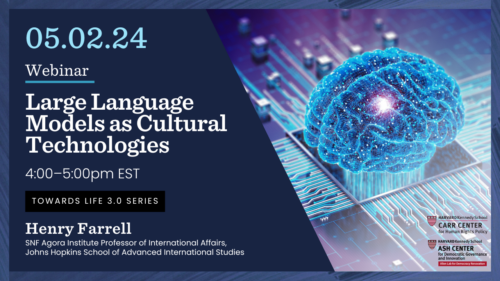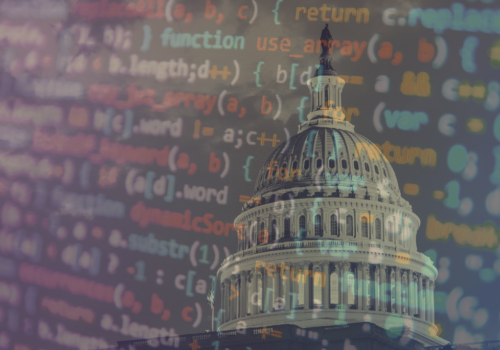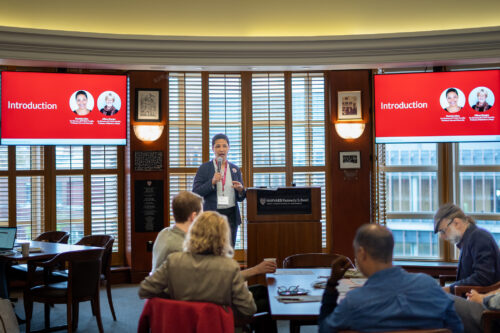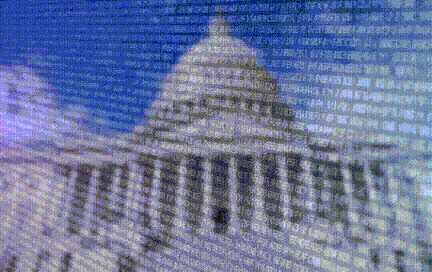Towards Life 3.0 with Henry Farrell
Online Event
Virtual, Registration Required
4:00 pm – 5:00 pm EDT

Understanding the promises and perils that AI holds for the future of our democracy
Allen Lab for Democracy Renovation, GETTING-Plurality, Reimagining Democracy Program
The proliferation of artificial intelligence has the potential to upend our democracy — for better or worse.
AI tools could allow for new forms of participation while at the same time facilitating the spread of misinformation. As regulators and policymakers struggle to understand the implications of this new technology, Ash Center experts are answering questions about how best to govern AI and not just reactively respond to the many issues that continue to arise.
Can AI be a force for good in our democracy? How do we prevent it from becoming a tool for those who wish to undermine our institutions and trust?
Explore our latest events, research, and writing below.
Online Event
Virtual, Registration Required
4:00 pm – 5:00 pm EDT
In-Person Event
9:00 am – 6:00 pm EDT
Video
The GETTING-Plurality Research Network at the Ash Center’s Allen Lab and Connection Science at MIT Media Lab hosted a webinar event focused on “AI and the Future of Privacy”. In this session, we hear from Bruce Schneier, security technologist, and Faculty Affiliate at the Ash Center; Sarah Roth-Gaudette, Executive Director of Fight for the Future; and Tobin South, MIT Ph.D. Candidate and Fulbright Scholar. Each presenter gives a lightning talk, followed by audience Q&A.
Policy Brief
We face a fundamental question: is the very pursuit of Artificial General Intelligence (AGI) the kind of aim democracies should allow?
Additional Resource
This essay was adopted from a presentation given by Aviv Ovadya at the Second Interdisciplinary Workshop on Reimagining Democracy held on the campus of Harvard Kennedy School in December 2023.
Additional Resource
This essay was adopted from a presentation given by Nathan Schneider at the Second Interdisciplinary Workshop on Reimagining Democracy held on the campus of Harvard Kennedy School in December 2023.
Additional Resource
“The Real Dangers of Generative AI” by Danielle Allen and Glen Weyl was featured in the January 2024 Journal of Democracy.
Abstract: As perhaps the most consequential technology of our time, Generative Foundation Models (GFMs) present unprecedented challenges for democratic institutions. By allowing deception and de-contextualized information sharing at a previously unimaginable scale and pace, GFMs could undermine the foundations of democracy. At the same time, the investment scale required to develop the models and the race dynamics around that development threaten to enable concentrations of democratically unaccountable power (both public and private). This essay examines the twin threats of collapse and singularity occasioned by the rise of GFMs.
Occasional Paper
Additional Resource
On November 7, 2023, the Summit on AI and Democracy gathered experts across multiple institutions to discuss ongoing research, policy, and development efforts related to the recent advancements in artificial intelligence.
Commentary
In a new essay, Harvard Kennedy School’s Bruce Schneier goes beyond AI generated disinformation to detail other novel ways in which AI might alter how democracy functions.
Additional Resource
“Reimagining Democracy for AI” by Aviv Ovadya was featured in the October 2023 Journal of Democracy.
Abstract: AI advances are shattering assumptions that both our democracies and our international order rely on. Reinventing our “democratic infrastructure” is thus critically necessary—and the author argues that it is also possible. Four interconnected and accelerating democratic paradigm shifts illustrate the potential: representative deliberations, AI augmentation, democracy-as-a-service, and platform democracy. Such innovations provide a viable path toward not just reimagining traditional democracies but enabling the transnational and even global democratic processes critical for addressing the broader challenges posed by destabilizing AI advances—including those relating to AI alignment and global agreements. We can and must rapidly invest in such democratic innovation if we are to ensure that our democratic capacity increases with our power.
Commentary
In a new essay, Bruce Schneier and Nathan Sanders argue that AI is poised to dramatically ramp up digital campaigns and outline how accountability measures across platforms, government, and the media can curb risks.
Feature
Computer scientist turned social scientist Ashley Lee discusses how policymakers and technologists alike can change the way AI is used — or not used — across the globe.
Commentary
In a new essay, Mary Graham argues that transparency measures can help curtail AI-related risks but not overnight — transparency efforts require sustained, long-term engagement and effort.
Commentary
Imagine that we’ve all – all of us, all of society – landed on some alien planet, and we have to form a government: clean slate. How would we govern ourselves?
Policy Brief
The GETTING-Plurality Research Network submitted a series of memos which respond to various questions posed around the topics of bolstering democracy and civic participation; protecting rights, safety, and national security; and promoting economic growth and good jobs.
Commentary
What if AI turns out to be the one tool able to identify what makes your ideas special, recognizing your unique perspective and potential on the issues where it matters most?












